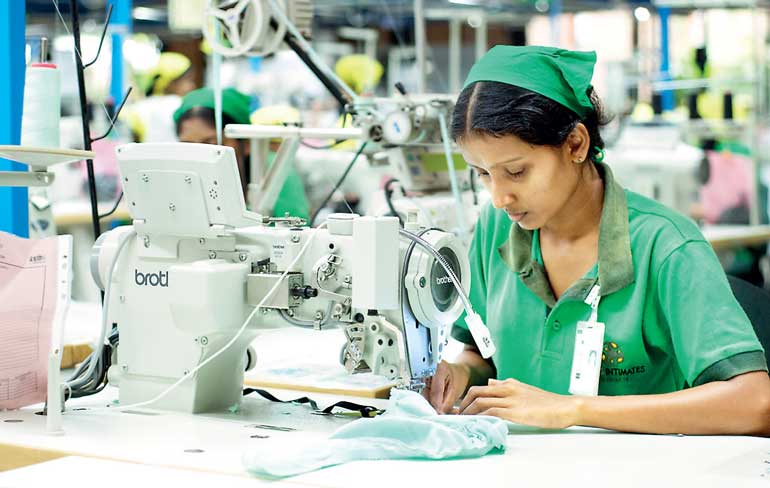Sunday Feb 15, 2026
Sunday Feb 15, 2026
Saturday, 30 December 2017 00:46 - - {{hitsCtrl.values.hits}}

By Skandha Gunasekara
The United States yesterday declined to extend its global preferential tariff system, which will now expire on Sunday but the development is likely to have a mixed impact on Sri Lankan exports as it does not cover major sectors such as apparel and tea but could hit some manufacturing segments such as plastic.
Despite the US being Sri Lanka’s largest single country destination for exports, Washington’s Generalised System of Preferences (GSP) program is different to the European Union’s GSP+, which has wider impact on Sri Lankan exports.
“The United States Congress did not re-authorise GSP before adjourning for the year. The immediate effect of GSP expiration is GSP eligible imports to the United States from Sri Lanka and other GSP beneficiary countries and territories will be subject to non-preferential duties beginning 1 January, 2018,” the US embassy said in a statement.
It also noted the United States remains proud to serve as the top export market for Sri Lanka. In 2016, the United States imported about $2.8 billion of Sri Lankan goods.
However, the rescinding of the U.S. General System of Preference (GSP) would have a marginal impact on Sri Lankan exports, Ceylon Chamber of Commerce Chief Economist Shiran Fernando told the Daily FT.
“The non-renewal of the GSP program is not Sri Lanka specific but covers 120 countries which will also not be eligible for preferential duties. While the process of the renewal is not clear at present, the renewal of the program in 2015 after a lapse of two years saw a retrospective refund provided for the period which imports to the US under the scheme did not enjoy the preferential duties,” he said.
While major exports such as apparel, tea, textiles and rubber would not be effected, Fernando said that smaller value exports that benefited from the GSP may be have to face more competition in the American market.
“In 2016, total exports to the US were $2.8 billion of which about 75% of it was apparel exports. According to data from the US Trade Representatives, the total value of exports under GSP program in 2016 was $173 million. Due to the cancelling of the GSP effecting 120 countries including Sri Lanka, our exports should have a level playing field with competitors in the U.S. market,” he added.
He went on to note that there had been instances in the past where the GSP was not granted for several years.
“The GSP scheme began in 1974, but there have been several occasion where the US did not grant the scheme. From 2013 there was a two year period where the GSP wasn’t granted,” he said adding that the US had made the decision not to award the GSP in 2013 as they’re import sector had fared badly at the time.
When queried as to what steps the Government can take in a situation where the GSP is not granted for a significant period, Fernando revealed that ongoing discussion with the US on the Trade and Investment Framework Agreement (TIFA) could be used to negotiate concessions for Lankan exports to the US.
Meanwhile, National Chamber of Exporter President Ramal Jasinghe said that the without the GSP, exports such as plastic exports would be effected.
“Approximately 3,451 different products from Sri Lanka are eligible to enter the United States duty-free under the GSP program. Many items are eligible for GSP duty-free treatment. These include: most manufactured items; inputs used in manufacturing; jewellery; many types of carpets; certain agricultural and fishery products; and many types of chemicals, minerals and marble,” Jasinghe said.
The Commerce and Industry Ministry also echoed the new that removal of GSP would only have “marginal impact” on the country’s exports to US.
“What is important to understand is that this non-renewal of US GSP does not affect our US trade in a significant way,” Industry and Commerce Minister Rishad Bathiudeen was quoted as saying in a statement released by his Ministry.
“The impact is even lower when it comes to total national exports. Only one fifth of our exports to US could be temporarily impacted by this routine event,” he added.
State Minister of International Trade Sujeewa Senasinghe told DailyFT that unlike when the GSP was previously revoked from Sri Lanka, this time the Government had no baggage and could easily negotiate to regain the GSP.
“We will do our utmost to get the GSP back. Unlike the former regime, our Government has no baggage. We have a great foundation, so it’s a matter of handling the issue in a diplomatic manner,” the Minister stressed.